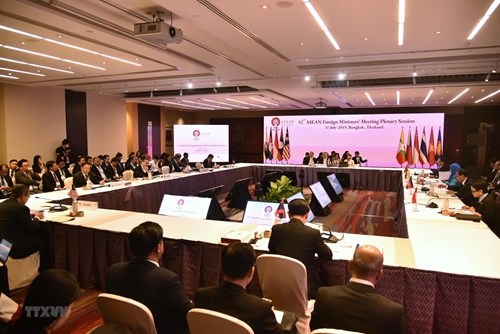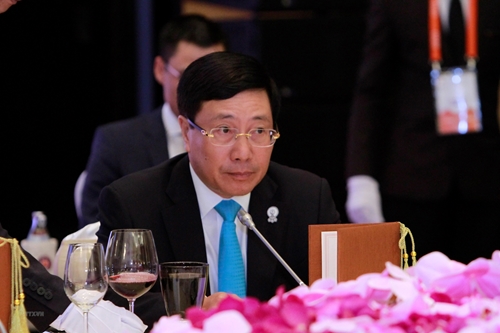The ministers affirmed their determination to fully and effectively implement the ASEAN Community Vision to 2025, continuously implement orientations and initiatives to build an ASEAN of self-reliance, creativity and sustainable development.
They agreed to promote efforts to implement the ASEAN Leaders' Vision Statement on Partnership for Sustainability, objectives of the ASEAN Community Vision to 2025, and the 2030 Agenda for Sustainable Development of the UN; and promote the building of strategies and plans to help ASEAN member nations full tap opportunities brought by the 4th industry revolution.
    |
 |
|
Ministers discussed series of regional issues at AMM-52 |
Delegates stressed the importance of completing negotiations for Regional Comprehensive Economic Partnership (RCEP) in 2019, enhancing cooperation in sub-regional development and building a new approach to narrow the development gap.
They agreed to continue implementing measures to improve working methods and operation efficiency of ASEAN.
The ministers underscored the importance of solidarity within ASEAN and the bloc’s central role in external relations, agreeing that ASEAN will continue to expand and deepen relations with its partners.
They agreed to introduce to partners about the ASEAN Outlook on the Indo-Pacific (AOIP), emphasizing the group’s goals and principles in cooperation for a peaceful and prosperous Indo-Pacific region.
The ministers reaffirmed their commitment to strengthening cooperation to maintain and promote regional peace, stability and security; and effectively address emerging challenges.
Accordingly, ASEAN will actively implement the ASEAN Political-Security Community by 2025, prioritizing cooperation in response to non-traditional challenges, strengthening defense-security cooperation and maritime cooperation, and actively promoting ASEAN principles and standards of conduct.
On the occasion, ASEAN foreign ministers signed a document to expand the Treaty of Amity and Cooperation in Southeast Asia (TAC), enabling Peru to join the treaty, raising the total members of the treaty to 38.
The ministers applauded positive progress on the Korean Peninsula, including inter-Korean summits and summits between the US and the Democratic People’s Republic of Korea, considering these a contribution to the long-term goal of a peaceful and stable Korean Peninsula without nuclear weapons.
They also had intensive and extensive discussions on the situation in the East Sea (South China Sea), took note of the concerns on the activities, especially the ongoing serious incidents in the East Sea. The ASEAN reaffirmed the importance of complying with international law and the UN Convention on the Law of the Sea UNCLOS 1982, and called on the sides to practice restraint, to not militarize, to avoid conducting acts that complicate the situation, and to settle disputes by peaceful means on the basis of international law and the UNCLOS 1982.
ASEAN countries are committed to continuing efforts to fully and effectively implement the Declaration on the Conduct of Parties in the East Sea (DOC) and to soon reach the effective and practical Code of Conduct in the East Sea (COC).
Speaking at the event, Vietnamese FM Pham Binh Minh highly valued results of the 4-year implementation of the ASEAN Community Vision to 2025. He called on ASEAN member nations to continue promoting intra-bloc solidarity and cooperation, and maintain its central role in external relations.
    |
 |
|
Vietnamese FM Pham Binh Minh at the meeting |
He stressed that the East Sea situation is complicated, including unilateral acts like militarization and increase of military exercises, especially the violation of Vietnam’s exclusive economic zone and continental shelf for illegal exploration activities by China’s Haiyang Dizhi 8 with the escort of their coast guard ships.
These actions seriously violate Vietnam’s sovereign right and jurisdiction prescribed in the UNCLOS 1982, Minh said, adding they are subsequent to the large-scale encroachment and militarization of the disputed structures in the sea. Furthermore, they also eroded trust, intensified tension and directly affected peace, stability, security, safety, freedom of aviation and navigation in the East Sea, violated the DOC and went against the commitment to maintaining a favorable environment for COC negotiations, he said.
He suggested ASEAN maintain solidarity and common voice, reaffirm its principles and commitments to peace and stability, call for restraint and non-unilateral actions that harm dialogues and regional cooperation and hinder legitimate economic activities of the coastal countries, and try to build an effective and practical COC.
Source: VNA